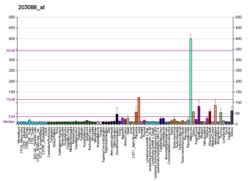Top Qs
Timeline
Chat
Perspective
FBLN5
Protein-coding gene in the species Homo sapiens From Wikipedia, the free encyclopedia
Remove ads
Fibulin-5 (also known as DANCE (developmental arteries and neural crest epidermal growth factor (EGF)-like)) is a protein that in humans is encoded by the FBLN5 gene.[5][6]
Remove ads
Function
The protein encoded by this gene is a secreted, extracellular matrix protein containing an Arg-Gly-Asp (RGD) motif and calcium-binding EGF-like domains. It promotes adhesion of endothelial cells through interaction of integrins and the RGD motif. It is prominently expressed in developing arteries but less so in adult vessels. However, its expression is reinduced in balloon-injured vessels and atherosclerotic lesions, notably in intimal vascular smooth muscle cells and endothelial cells. Therefore, the protein encoded by this gene may play a role in vascular development and remodeling.[6]
Remove ads
Interactions
FBLN5 has been shown to interact with LOXL1[7] and apolipoprotein(a).[8]
Clinical relevance
FBLN5 mutations have been described in patients with age-related macular degeneration, as well as being involved in Charcot-Marie-Tooth neuropathies.[9]
References
Further reading
External links
Wikiwand - on
Seamless Wikipedia browsing. On steroids.
Remove ads





